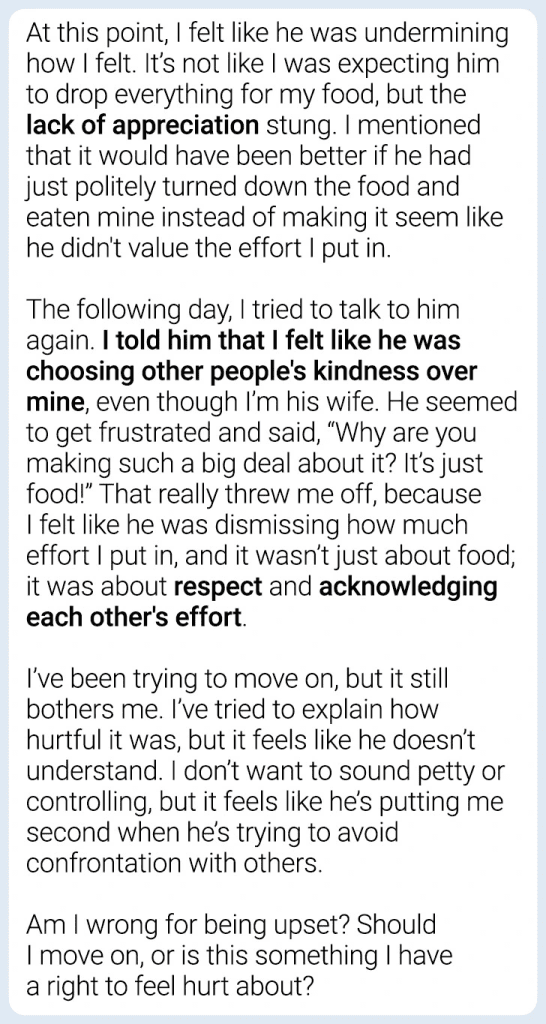
Tina started her day with love and intention. She woke early, prepared a thoughtful breakfast for her husband, and imagined the smile it would bring. But instead of enjoying her homemade meal, he chose food a coworker had brought. On the surface, it might look like a small thing. Yet to Tina, it felt like a quiet heartbreak—a moment where her effort went unnoticed.

It’s Not About the Food—It’s About the Message
This wasn’t just about eggs and toast. When you pour time and care into something for someone you love, you naturally hope for acknowledgment. Tina’s husband may not have meant any harm, but his choice sent an unspoken message: her effort didn’t matter. That stings, doesn’t it? Because when small acts of love are overlooked, it can feel like you are being overlooked too.
Video: My Husbands Female Colleague Is CONVINCED She’s Having An Affair With Him
Why Emotional Validation Matters More Than We Think
What hurt even more was his reaction when Tina shared her disappointment. Instead of validating her feelings, he brushed them aside. Emotional validation—simply saying, “I understand why you feel that way”—can be more powerful than any apology. Without it, hurt feelings can fester and eventually harden into resentment. It’s like ignoring a tiny crack in a wall until it grows into something harder to repair.

Boundaries and Outside Influences
Sharing food at work is harmless on most days. But when it starts to affect a partner’s emotions, it may signal the need for clearer boundaries. If similar situations repeat, it’s worth talking about it—not to control the other person, but to protect the emotional balance of the relationship. Healthy relationships thrive when both partners feel their efforts are valued above outside distractions.
Video: 9 Signs of Poor Boundaries
Small Disappointments Add Up Over Time
Relationships rarely collapse because of a single big event. More often, it’s the slow drip of small disappointments that wears down the bond. When one partner’s feelings are dismissed again and again, trust and warmth begin to fade. That’s why it’s crucial to address these moments early, before they snowball into bigger conflicts.

Starting the Conversation Without Blame
So how can Tina approach this? Calm honesty works best. Instead of pointing fingers, she could share how she felt:
“When I made breakfast for you, it was my way of showing love. When you chose something else, I felt unappreciated. It’s not really about the food—it’s about wanting to feel that my efforts matter.”
By framing it this way, Tina opens the door for understanding rather than defensiveness.
Video: Difference Between An Emotional Affair And Friendship
Opportunities for Growth and Connection
Tina’s husband now has a chance to strengthen their relationship. Small, consistent actions can make a big difference:
- Recognize and thank each other for even the tiniest gestures.
- Show appreciation through words, hugs, or simple notes.
- Be mindful of how small choices—like a quick breakfast decision—can send unintended signals.

At its heart, this isn’t a story about breakfast—it’s about the universal need to feel seen and valued by the person we love. Relationships flourish when both partners actively show appreciation, and they weaken when those efforts go unnoticed. By practicing open communication and daily gratitude, couples can turn small disappointments into opportunities to grow closer, proving that love isn’t just in grand gestures—it lives in the quiet recognition of everyday acts of care.


